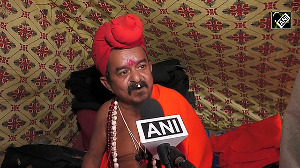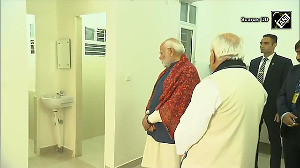 Television owners might have to again shell out a licence fee- this time to fund state-owned Prasar Bharati, which runs Doordarshan and All India Radio, if a government committee has its way.
Television owners might have to again shell out a licence fee- this time to fund state-owned Prasar Bharati, which runs Doordarshan and All India Radio, if a government committee has its way.
The move is aimed at generating annual revenue of around Rs 1,000 crore (Rs 10 billion) for the financially ailing body.
The proposal has been floated by a working group on 'Business Development of Prasar Bharati', constituted under the chairmanship of Sam Pitroda, advisor to the Prime Minister on information infrastructure and innovation.
Some have criticised the suggestions. "This is not a feasible idea. When the whole system is moving away from licence raj, bringing back the licence system for television which existed in the early '80s for radio sets is wrong," S Y Quraishi, former Director General of Doordarshan and then Chief Election Commissioner, told Business Standard.
Earlier, too, in the late 1990s, the Nitish Sengupta committee on restructuring Prasar Bharati had suggested adopting the BBC model of a TV licensing fee. This was not accepted because of the perceived complexities involved.
The new committee under Pitroda also has a mandate to review the implementation of recommendations made regarding Prasar Bharati by the earlier Sengupta, Bakshi and Narayanamurthy committees. The final report is expected in the next three to four months.
Within Britain, the BBC is funded largely by an annual television licence fee, charged on all British households, companies and organisations using any equipment to receive live television broadcasts. The level is set annually by the government and has to be agreed by Parliament.
Other ideas
Officials in the know said the Pitroda group has also suggested a subscription model for Prasar Bharati, wherein niche channels are made 'pay' channels and moved away from the current free-to-air system to generate revenues. "The committee recognised that there is a need to separate the public service broadcasting and commercial broadcasting activities of Prasar Bharati," said a senior official in the know of the development.
Quraishi said the subscription model as suggested by the working group was also not feasible. For, Doordarshan is a public broadcaster and even by levying a subscription fee, not much revenue could be earned.
The group also advocated leveraging all the assets of Prasar Bharati such as real estate and power transmitters and closing the non-viable centres (Kendras) of Doordarshan and AIR.
Quraishi was supportive of the idea to leverage the assets and transmitters of Doordarshan and AIR. "These are, indeed, very good suggestions but while ensuring that revenues are earned from commercially exploiting the assets of Prasar Bharati, it should all be done in a transparent manner," he said.
The panel comprises Jawhar Sircar, chief executive, Prasar Bharati; Jitendra Mathur, additional secretary, ministry of information and broadcasting; Asha Swarup, former secretary in this ministry; B K Gairola, mission director (e-governance); Shekhar Kapur, member, Innovation Council; and M P Gupta of IIT Delhi. In the 2013-14 Union Budget, the government allocated Rs 2,180 crore as grants to Prasar Bharati, 26 per cent more than the revised estimate for 2012-13. These were meant for the salaries and related issues.










 © 2025 Rediff.com -
© 2025 Rediff.com -